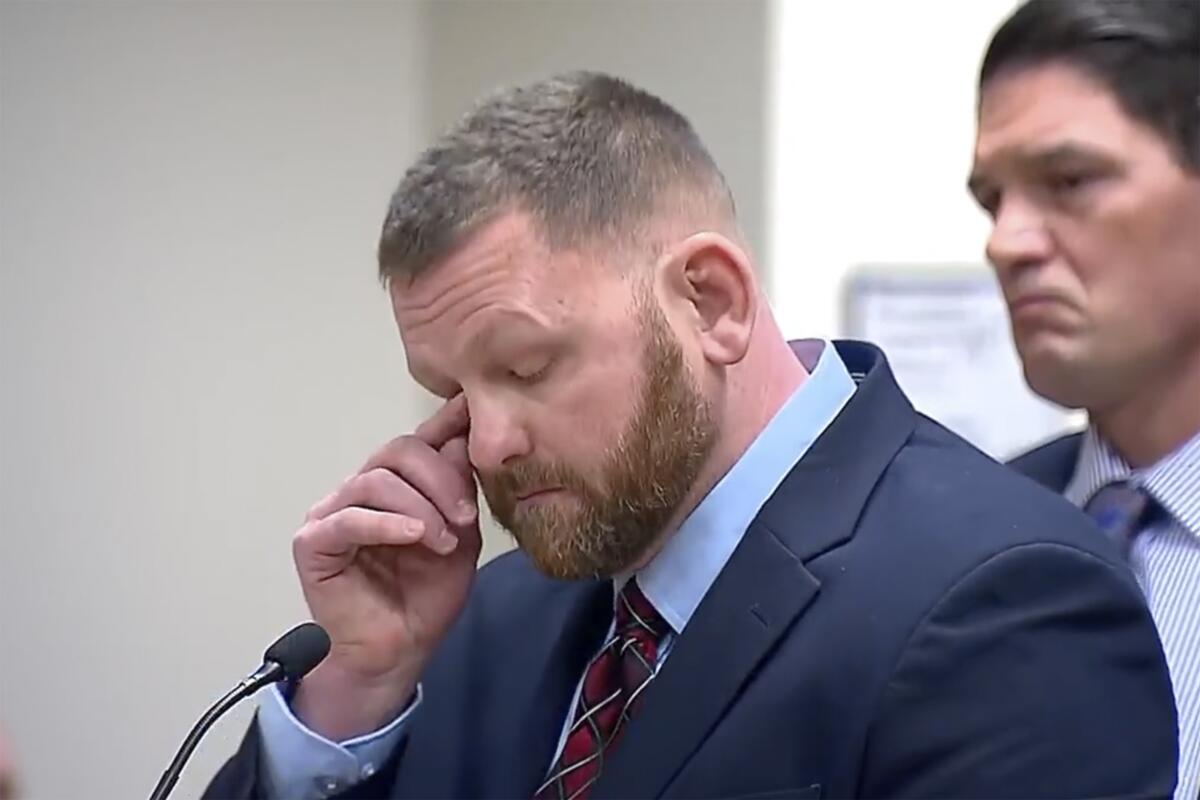Ex-Colorado police officer who killed Elijah McClain gets 14 months in jail, avoids prison

- Share via
DENVER — A judge sentenced an ex-Colorado police officer to 14 months in jail for his role in the death of Elijah McClain after hearing the young Black man’s mother Friday call the officer a “bully with a badge” who will always have blood on his hands.
The officer, Randy Roedema, was the most senior law enforcement member charged in McClain’s death and the only one found guilty. He was the most senior officer who initially responded to the scene. A jury convicted him in October of criminally negligent homicide, which is a felony, and third-degree assault, which is a misdemeanor.
The 23-year-old’s killing received little attention at the time of his death in August 2019, but gained renewed interest the next year as mass protests swept the nation over the murder of George Floyd by Minneapolis police. McClain’s death became a rallying cry for critics of racial injustice in policing.
In a separate trial, two paramedics were recently convicted for injecting McClain with an overdose of the sedative ketamine after police put him in a neck hold. Sentencing will come later this year for the paramedics, who had been trained to use ketamine to treat “excited delirium ” — a disputed condition some say is unscientific, rooted in racism and used to justify excessive force.
Grab a jacket. The next few days in Southern California will be colder than average with strong winds.
Before the judge handed down the sentence, McClain’s mother, Sheneen McClain, raged against Roedema after he expressed remorse but stopped short of apologizing.
“Randy Roedema stole my son’s life,” she said. “All the belated apologies in the world can’t remove my son’s blood from Randy Roedema’s hands.”
Protecting the community was “the furthest thing from his mind” the night her son was stopped walking home from the store, she said.
Roedema also spoke at the hearing, as did his sister and the ex-Marine’s former military colleagues.
“I want the McClain family to know the sadness I feel about Elijah being gone. He was young,” Roedema said.
Roedema suggested Friday that first responders get more training in how to deal with such situations that led to McClain being given an overdose.
“Ultimately the situation has caused a lot of pain, and we are faced with the choice of how to deal with it,” Roedema said.
McClain was stopped by police after a 911 caller reported that he looked suspicious. Another officer put his hands on McClain within seconds, beginning a struggle and restraint that lasted about 20 minutes before paramedics injected him with ketamine. Experts say the sedative ultimately killed McClain, who was already weakened from struggling to breath while being pinned down after inhaling vomit into this lungs.
For Roedema, criminally negligent homicide, defined as killing someone by failing to recognize a substantial risk to their life, carried a punishment ranging from probation to three years in prison. The assault conviction was punishable by probation to two years in jail.
Judge Mark Warner, a former prosecutor who has been a judge for nearly 20 years, had to determine a fair sentence by weighing how this homicide case compares with others he has seen in his career, said former Dist. Atty. George Brauchler. A first conviction can lead to a sentence of probation, but the judge must also consider that Roedema was a uniformed police officer, given special authority and respect by society, and a jury convicted him of taking a life, Brauchler said.
“I don’t know how that person gets to go home that night” on probation, said Brauchler, who prosecuted the 2012 Aurora, Colo., theater shooting case. “I think that would be very tough.”
Roedema helped hold McClain down while paramedics administered the ketamine. He was often visible in the body-camera video shown over and over to jurors, and could be heard directing others how to restrain him.
The same jury that convicted Roedema acquitted former Officer Jason Rosenblatt, whose lawyers stressed that he wasn’t close to McClain when the ketamine was injected.
A different jury acquitted Officer Nathan Woodyard a few weeks later, after he testified that he put McClain in a neck hold, briefly rendering him unconscious. Woodyard testified that he feared for his life after Roedema said McClain had grabbed for one of their guns. Prosecutors say the gun grab never happened.
Aurora Fire Rescue paramedics Jeremy Cooper and Peter Cichuniec were convicted last month. Cichuniec, the senior officer, was found guilty of the most serious charge faced by any of the first responders: felony second-degree assault. It carries a mandatory prison sentence of between five and 16 years in prison.
In a statement after those final verdicts, McClain’s mother said having three out of the five defendants convicted was not justice, merely “a very small acknowledgment of accountability in the justice system.”
“There were at least 20 individuals there the night my son was alive and talking before he was brutally murdered. Aurora Colorado Police Department and Fire Department kept everyone else on their payroll because both of those departments lack humanity, refusing to admit their inhumane protocols,” she said.
The paramedics’ verdicts came a day after a jury in Washington state cleared three police officers of all criminal charges in the 2020 death of Manuel Ellis, a Black man who was shocked with a stun gun, beaten and restrained face-down as he pleaded for breath.
Candace McCoy, professor emerita at John Jay College of Criminal Justice, doesn’t see the recent acquittals there or in Colorado as a sign that the push for police reform is waning. Instead, she said it’s a reflection of how hard it is to convict police officers of crimes because jurors tend to give them the benefit of the doubt for how they act in emergencies.
While it was rare to prosecute cases against law enforcement in the past, the fact that more officers are being pursued now is not enough to create police reform, she said.
“The way to change and reform the police is to change the culture and the departments, and individual prosecutions will not do that,” McCoy said.
More to Read
Sign up for Essential California
The most important California stories and recommendations in your inbox every morning.
You may occasionally receive promotional content from the Los Angeles Times.














